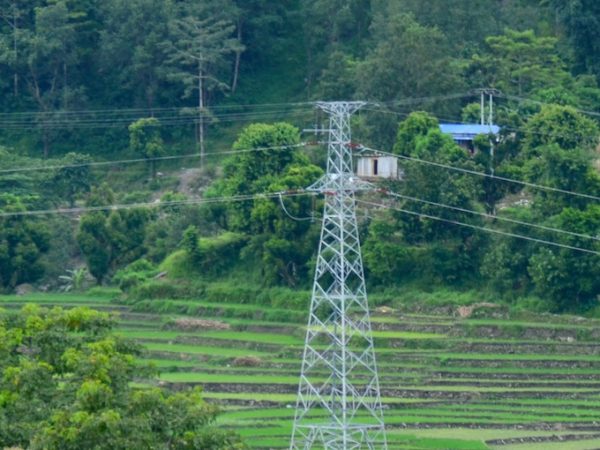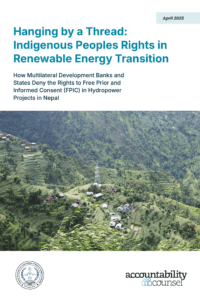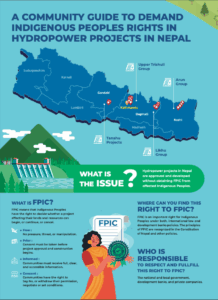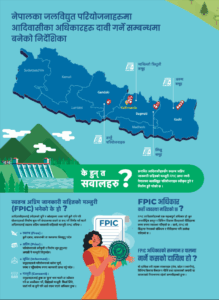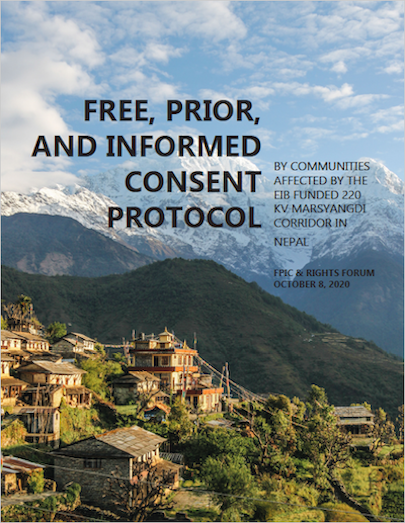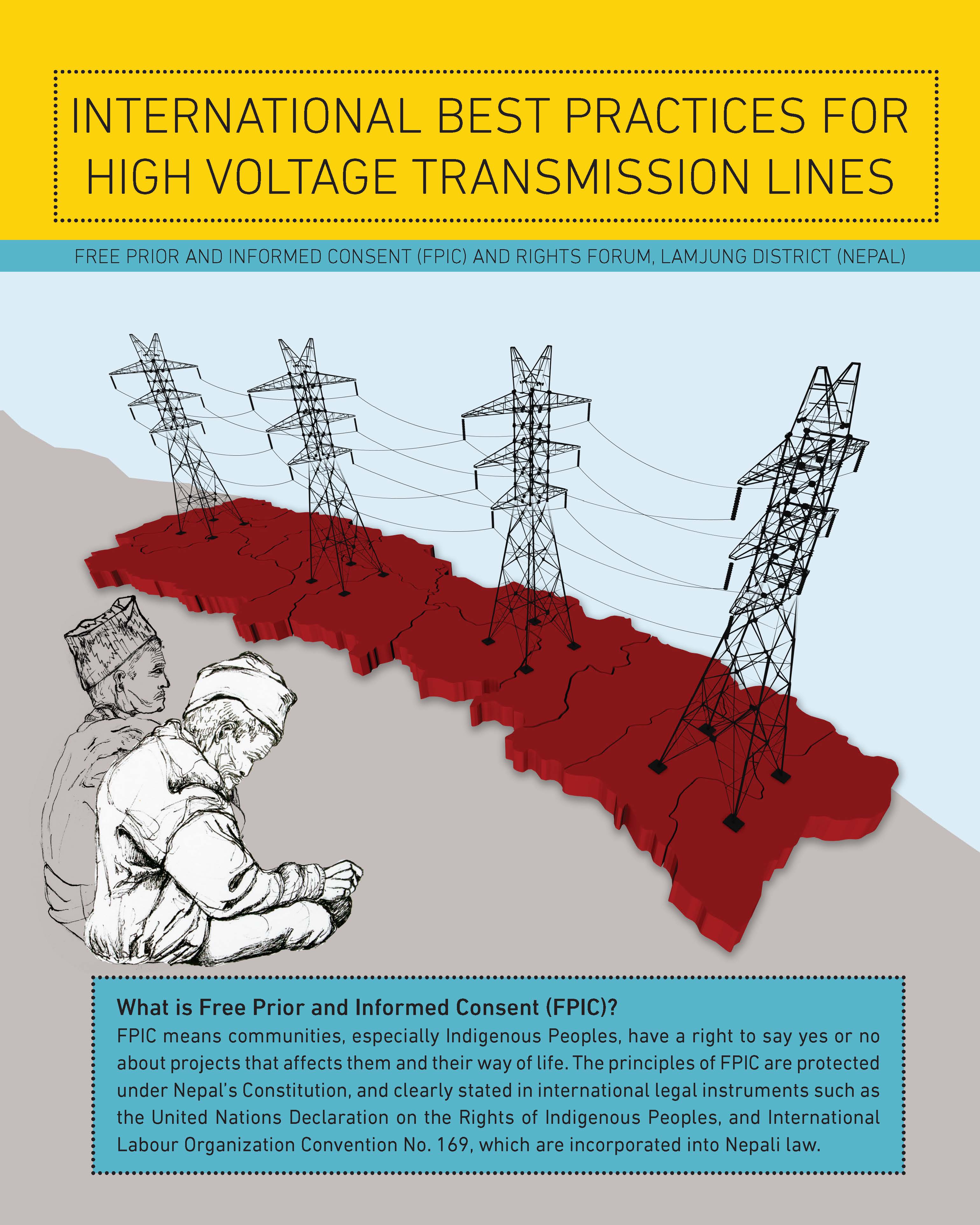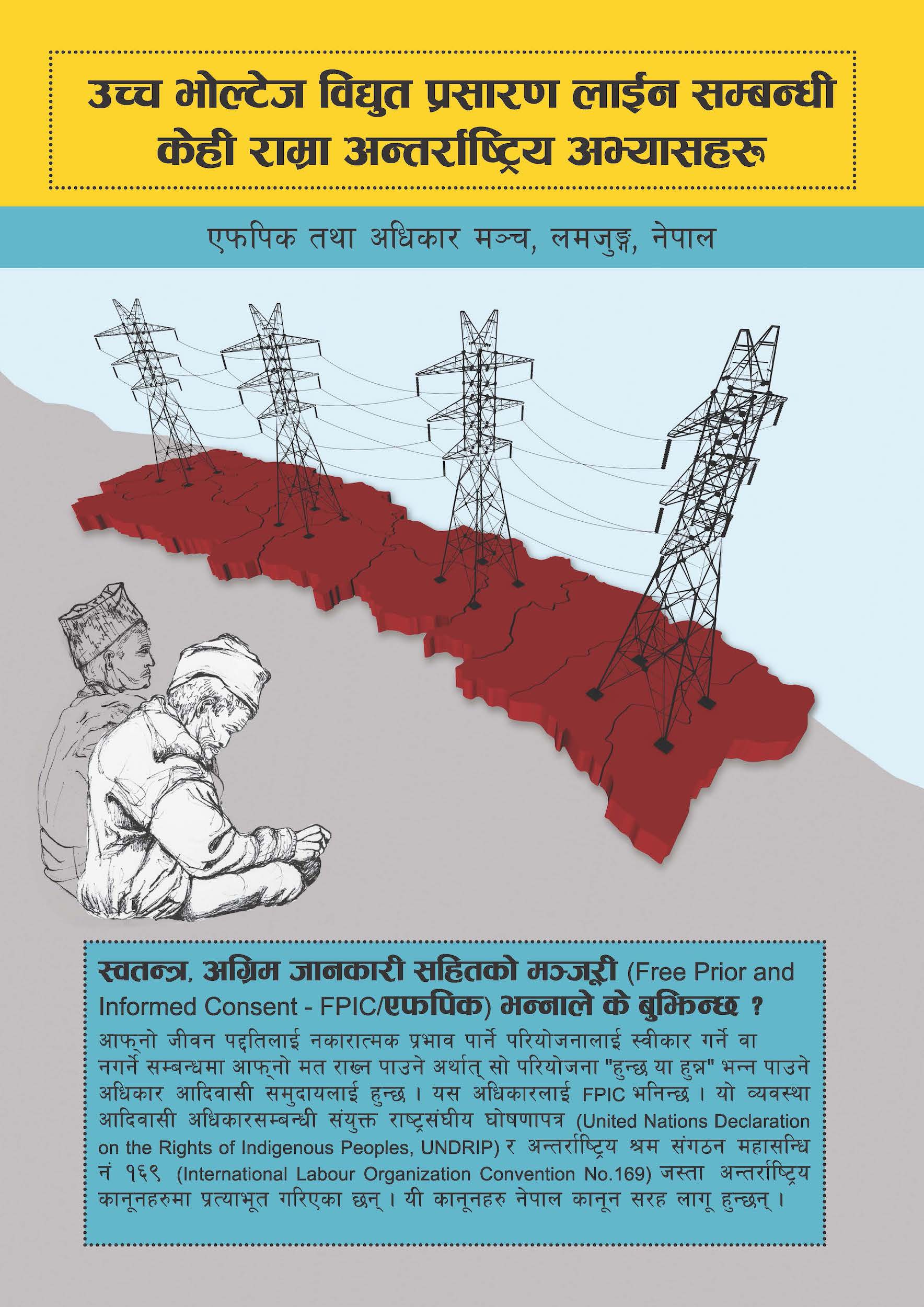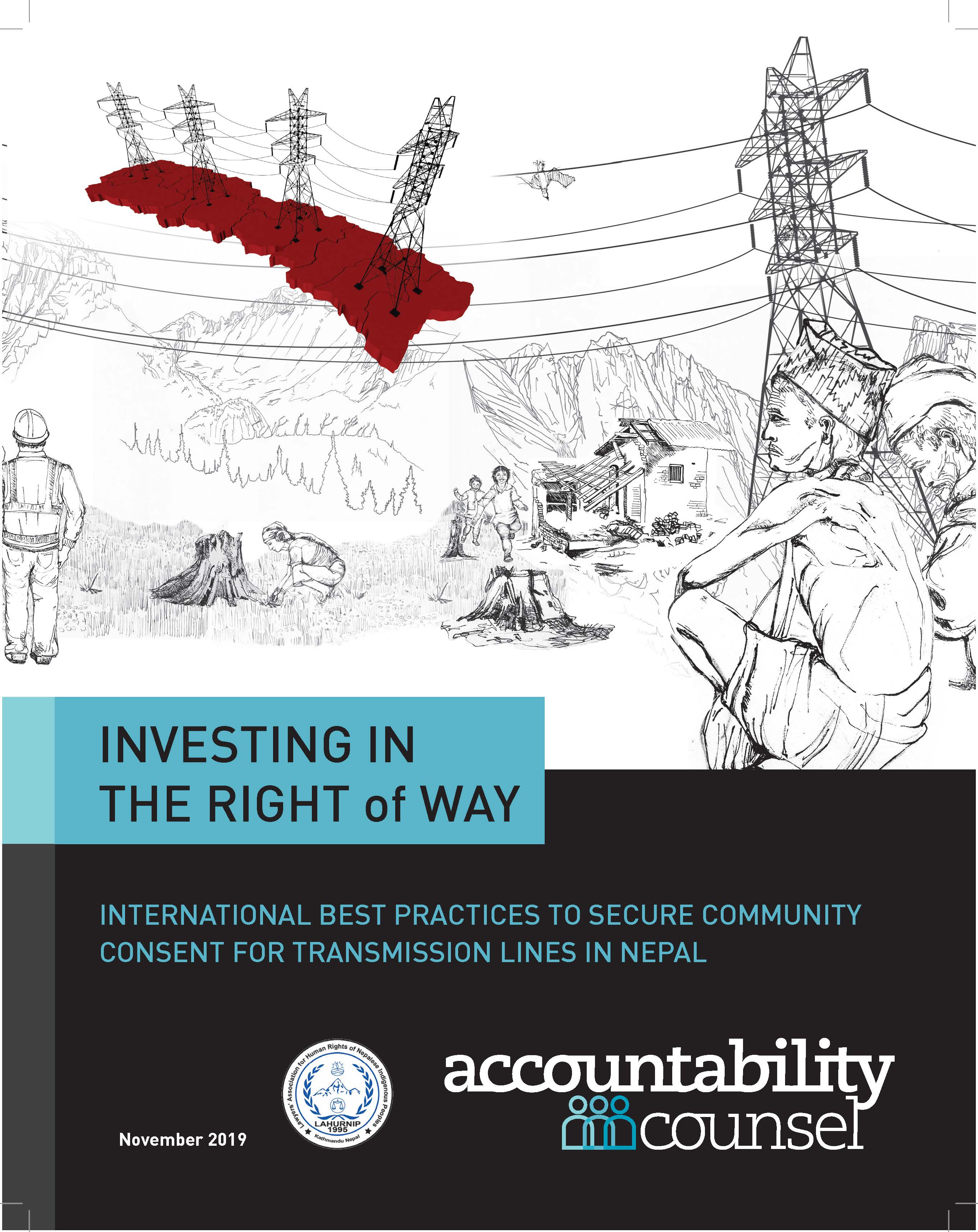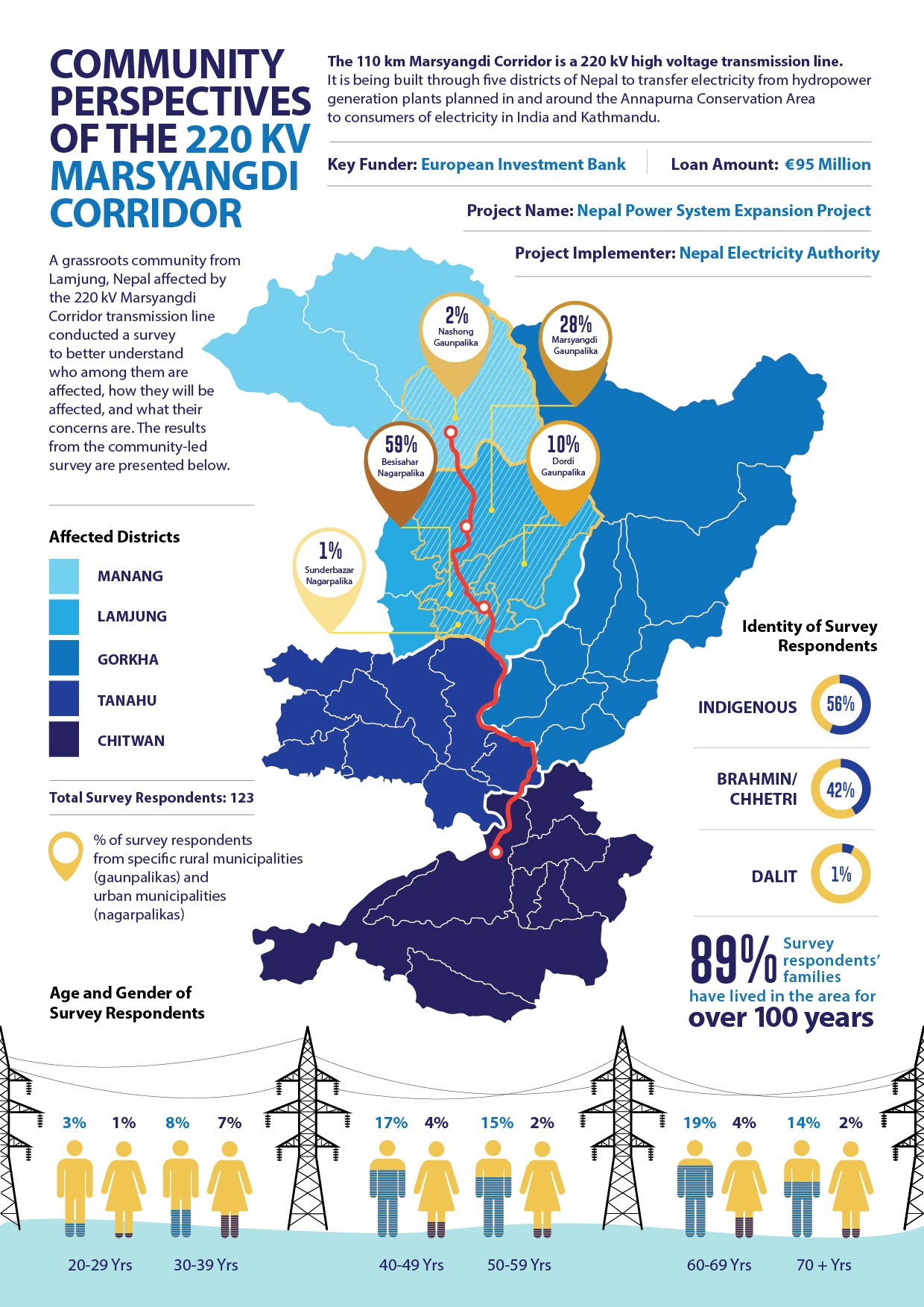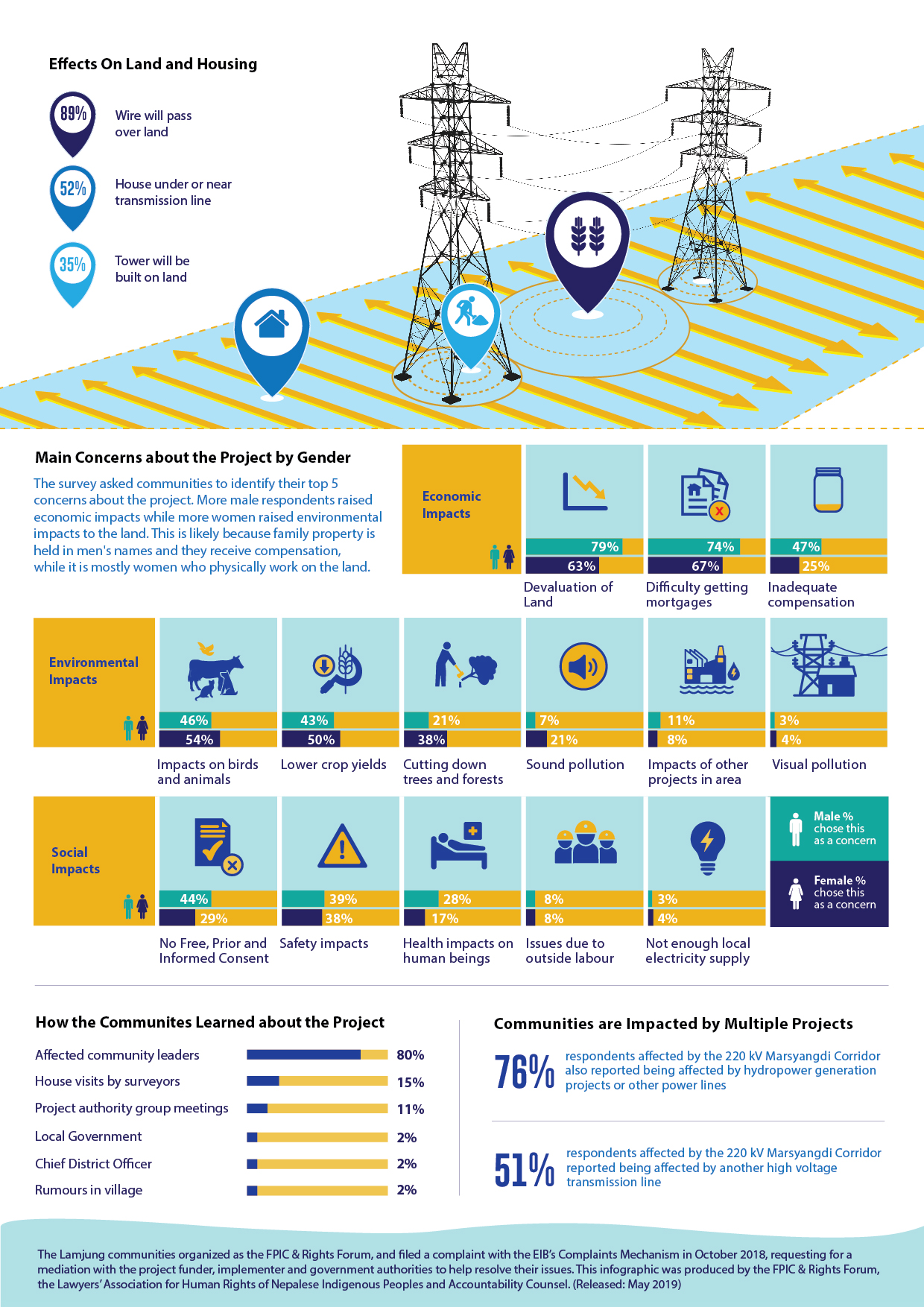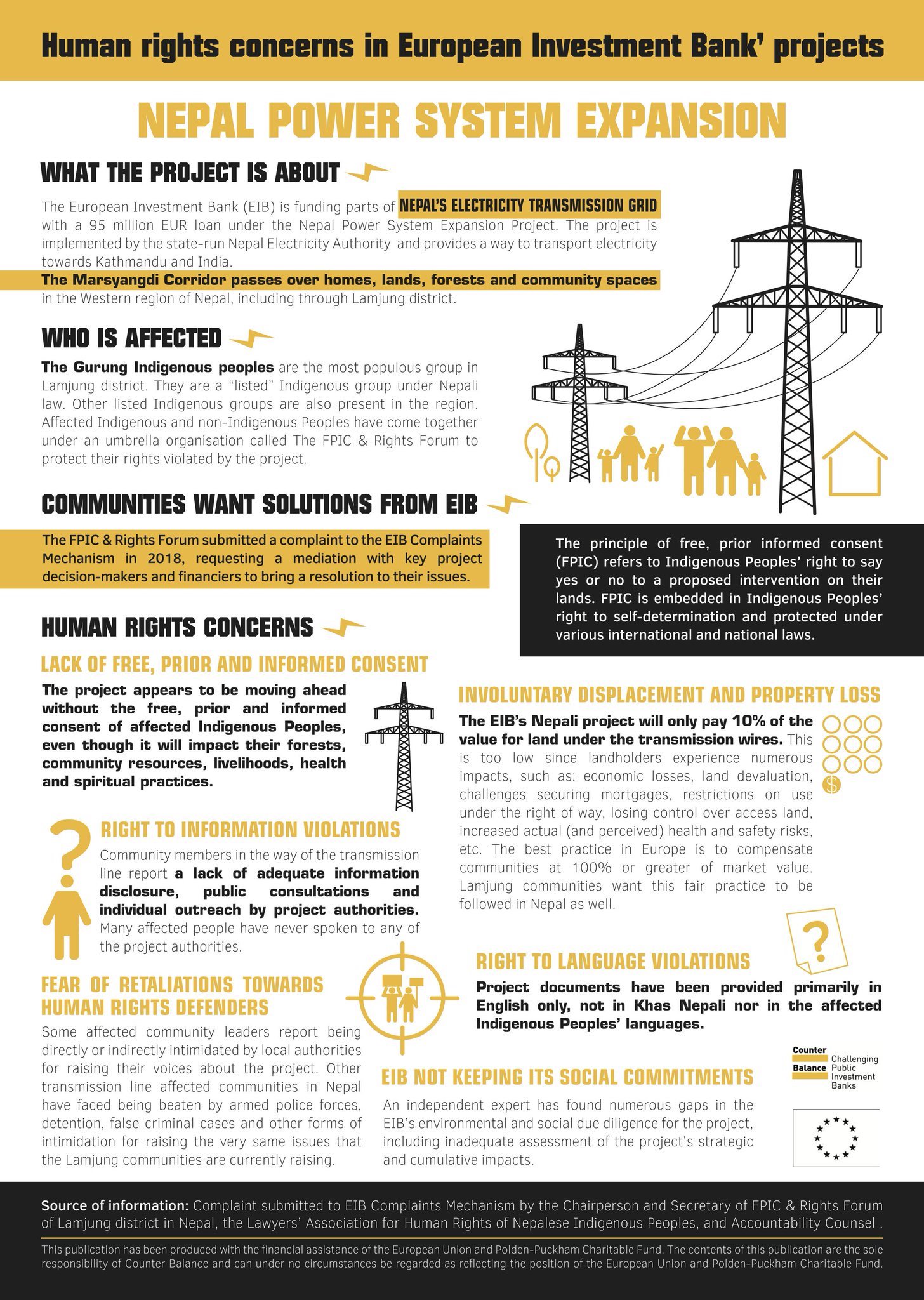Nepal: 220 kV Marsyangdi Corridor Transmission Line
-
Overview
The Lawyers’ Association for Human Rights of Nepalese Indigenous Peoples (LAHURNIP) and Accountability Counsel are supporting communities in the Lamjung district of Nepal who have been affected by a European Investment Bank (EIB) financed high-voltage transmission line, passing over their homes, lands, forests, and community spaces.
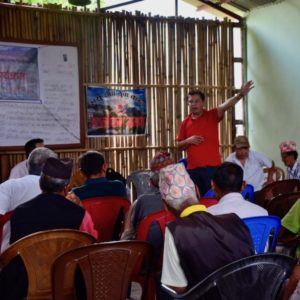 The EIB is funding the 220 kV Marsyangdi Corridor as part of its nearly 100 million euro Nepal Power System Expansion Project. The Nepal Electricity Authority is implementing the project. It is a major project among numerous existing and proposed power sector projects in Lamjung district, such as the Nyadi and Dordi hydropower projects, and the Chinese implemented 132 kV Bhulbhule Mid-Marsyangdi transmission line.
The EIB is funding the 220 kV Marsyangdi Corridor as part of its nearly 100 million euro Nepal Power System Expansion Project. The Nepal Electricity Authority is implementing the project. It is a major project among numerous existing and proposed power sector projects in Lamjung district, such as the Nyadi and Dordi hydropower projects, and the Chinese implemented 132 kV Bhulbhule Mid-Marsyangdi transmission line.The communities’ main concern is that the project and authorities have failed to take steps to seek local peoples’ free, prior, and informed consent (FPIC), even though community land rights of traditionally governed Indigenous communities are directly implicated by the 220 kV Marsyangdi Corridor, and Indigenous Gurung are the most populous group in Lamjung district.
Affected communities are concerned that the project authorities have failed to provide meaningful information disclosure and consultation about the project’s environmental, human rights, and economic livelihood impacts, including:
- health, safety and other impacts on humans, animals, birds, and plants;
- physical displacement;
- economic displacement including restrictions on land use, devaluation of land, and restrictions on securing mortgages;
- forest cover reduction and other environmental issues;
- visual and sound impacts;
- social issues resulting from outside labor; and
- cumulative impact with the other projects in the region.
The lack of information disclosure and consultation is in sharp violation of international and domestic requirements to seek FPIC of Indigenous Peoples. Affected communities have organized together under the umbrella organization, the FPIC & Rights Forum, to demand their rights.
The communities filed a complaint with the EIB’s Complaints Mechanism in 2018 requesting a mediation to help resolve their issues with project financiers, promoters and government authorities. The Complaints Mechanism released their Initial Assessment Report in July 2019 recommending mediation to resolve communities’ issues. While the FPIC & Rights Forum agreed to participate in a mediation process, the NEA refused to participate. The Complaints Mechanism is now conducting a compliance investigation to determine whether the EIB has followed its environmental and social requirements in this project.
In October 2020, the FPIC & Rights Forum published an FPIC Protocol, providing concrete guidance to the EIB and NEA on designing an FPIC process. Developed through consultation with communities, the protocol outlines the steps project authorities must take, including sharing all project information in languages Indigenous communities understand, ensuring an environment free of coercion, and fully abiding by whatever decision Indigenous Peoples reach.
On April 22, 2021, the EIB Complaints Mechanism published its Conclusions Report, finding that the EIB must take urgent steps to uphold Indigenous communities’ right to FPIC. The report vindicates concerns communities have been raising for years, including that a mandatory FPIC process was not conducted. It finds the EIB provided funding to the NEA even though conditions for disbursement were not fulfilled and recommends the EIB only provide further financing for the Marsyangdi Corridor if the project company meets certain social and environmental benchmarks. The FPIC & Rights Forum, LAHURNIP and Accountability Counsel issued a joint press release.
Read more about the EIB’s Complaints Mechanism.
“There will be no sky left in Lamjung, with all these transmission lines!”
– Hari Prasad Adhikari, community member from Bhoteodar, Lamjung
-
The Story
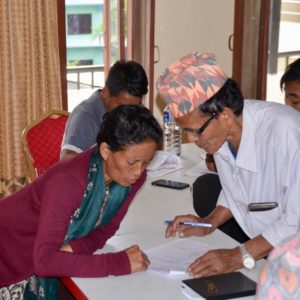
Local communities have come together to demand that development of the hydropower sector in Lamjung respect their rights, including by seeking their free, prior, and informed consent (FPIC) for projects that will affect them and their way of life.
FPIC is an international legal standard that applies especially to Indigenous Peoples. FPIC is protected under Nepal’s constitution and under international law, such as the United Nations Declaration on the Rights of Indigenous Peoples (UNDRIP), and International Labour Organization (ILO) Convention 169.
Communities in Lamjung district have repeatedly raised their concerns that local hydropower sector projects, including the 220 kV Marsyangdi Corridor, are violating their rights.
Our client, the FPIC & Rights Forum
The FPIC & Rights Forum is an umbrella organization for local-level Struggle Committees of peoples affected by various power sector projects in the region including the EIB funded 220 kV Marsyangdi Corridor.
Indigenous and other peoples have coming together as the the FPIC & Rights Forum to work together in solidarity. Many in the group are Gurung, Ghale, Chetri/Brahman, Tamang etc. The traditional leadership of Khasur village, a traditional Indigenous Gurung village represented in the FPIC & Rights Forum, are concerned their traditional forests and lands by the Marsyangdi river will be impacted by the project and its associated facilities.
Initial Steps
Communities asked LAHURNIP and Accountability Counsel for help to understand the Initial Environmental Examination (IEE) for the Udipur-Markichowk-Bharatpur segment of the 220 kV Marsyangdi Corridor transmission line. As background, the proposed 220 kV Marsyangdi Corridor has been divided into multiple segments: from Manang district to Khudi (in Lamjung district), Khudi to Udipur (in Lamjung district), then from Udipur to Markichowk (in Tanahu district) and Markichowk to Bharatpur (in Chitwan district). The EIB funded Nepal PSEP also includes a line connecting the Marsyangdi Corridor from Markichowk to Kathmandu.
LAHURNIP and Accountability Counsel requested the expertise of Mr. Mark Cherniak, an independent Staff Scientist with the U.S. office of Environmental Law Alliance Worldwide (ELAW). ELAW’s report found there were serious gaps in the IEE, including:
- Issues with geographic coordinates for the location of the transmission line;
- Failure to consult with people under the transmission wires;
- Analysis for route selection was not done properly;
- Public safety impacts were not properly addressed;
- Inadequate assessment of existing flora and fauna in the area;
- Impacts to forests do not appear to be credibly minimized;
- Assessment of the project should be done holistically, rather than small parts separately;
- Failure to look at cumulative impacts from all projects in Lamjung; and
- Failure to conduct a Strategic Environmental Assessment.
At the request of the FPIC & Rights Forum, LAHURNIP and Accountability Counsel sent a letter to the EIB highlighting: salient gaps in the IEE, violations of international and domestic laws and norms, and steps to remedy violations. EIB provided positive preliminary comments, expressing a willingness to engage, but they asked for more time to respond properly to communities’ concerns. LAHURNIP and Accountability Counsel shared the EIB’s response with the communities, who were grateful for the EIB’s positive tone. The communities asked us to send a follow up letter to the EIB.
The Complaint
Since the project is moving ahead regardless, communities are concerned violations of their rights will further crystallize. As a result, the FPIC & Rights Forum have now raised their issues by filing a complaint to the Complaints Mechanism, which is a part of the European Union’s accountability framework for the bank.
In their complaint, the communities have asked for a mediation with key project decision-makers – especially the EIB, the Nepali authorities, and the Nepal Electricity Authority – to help resolve their concerns about the 220 kV Marsyangdi Corridor and associated hydropower sector projects.
At the end of July 2019, the Complaints Mechanism released their Initial Assessment Report recommending mediation to resolve communities’ issues. Following the release of the report, the FPIC & Rights Forum agreed to participate in a mediation process with the NEA and the EIB. Unfortunately, the NEA said no to the mediation process and the Complaints Mechanism is now conducting a compliance investigation to determine whether the EIB has followed its environmental and social requirements in the Marsyangdi Corridor.Conclusions Report
On April 22, 2021, the EIB Complaints Mechanism published its Conclusions Report, finding that the EIB must take urgent steps to uphold Indigenous communities’ right to FPIC. The report vindicated concerns communities have been raising for years, including that a mandatory FPIC process was not conducted. It found the EIB provided funding to the NEA even though conditions for disbursement were not fulfilled and recommended that the EIB only provide further financing for the Marsyangdi Corridor if the project company meets certain social and environmental benchmarks.The EIB Complaints Mechanism issued a set of recommendations, including that “major lenders and development partners in the energy sector coordinate efforts and -with the help of experts- work closely… to develop a tailor-made approach for meeting FPIC requirements in energy projects in Nepal.”The FPIC & Rights Forum, LAHURNIP and Accountability Counsel issued a joint press release.Case Partners
Lawyers’ Association for Human Rights of Nepalese Indigenous Peoples (LAHURNIP): LAHURNIP is a Kathmandu (Nepal) based civil society organization of Indigenous lawyers. LAHRUNIP provides free legal aid services and work to promote, protect, and defend the human rights of Indigenous peoples in Nepal.
Environmental Law Alliance Worldwide (ELAW): ELAW is a global alliance of attorneys, scientists, and other advocates collaborating across borders to promote grassroots efforts to build a sustainable, just future.
-
The Case
-
Apr 2021
On April 22, 2021, the EIB Complaints Mechanism published its Conclusions Report, finding that the EIB must take urgent steps to uphold Indigenous communities’ right to FPIC. The report vindicated concerns communities have been raising for years, including that a mandatory FPIC process was not conducted. It found the EIB provided funding to the NEA even though conditions for disbursement were not fulfilled and recommended that the EIB only provide further financing for the Marsyangdi Corridor if the project company meets certain social and environmental benchmarks. The FPIC & Rights Forum, LAHURNIP and Accountability Counsel issued a joint press release. The EIB released a public statement.
-
Oct 2020
On 8 October 2020, exactly two years after filing a complaint to the EIB, the FPIC & Rights Forum published an FPIC Protocol, and a press release, providing concrete guidance to the EIB and NEA on designing an FPIC process. Developed through consultation with communities, the protocol outlines the steps project authorities must take, including sharing all project information in languages Indigenous communities understand, ensuring an environment free of coercion, and fully abiding by whatever decision Indigenous Peoples reach.
-
Jul 2019
On 22 July 2019, the Complaints Mechanism published the Initial Assessment Report concluding that many of the points raised in the complaint seem well suited for a collaborative resolution process between the Complainants and the Promoter to be facilitated by the Complaints Mechanism.
Following the release of the report, the FPIC & Rights Forum agreed to participate in a mediation process with the NEA and the EIB. Unfortunately, the NEA said no to the mediation process and the Complaints Mechanism transferred the case to compliance investigation to determine whether the EIB has followed its environmental and social requirements in the Marsyangdi Corridor. -
May 2019
Communities released findings of a community led survey through a survey report and infographic.
-
Mar 2019
The head of the Complaints Mechanisms and the most senior mediator visited Lamjung to conduct an initial assessment of the communities’ complaint.
-
Oct 2018
The communities filed a complaint with the Complaints Mechanism, the EIB’s independent watchdog and mediation office in Luxembourg.
-
Oct 2018LAHURNIP and Accountability Counsel sent a constructive follow up letter to the EIB, at the request of communities.
-
Sep 2018EIB provided preliminary comments, expressing a willingness to engage, but they asked for more time to respond properly to communities’ concerns. LAHURNIP and Accountability Counsel shared the letter with communities.
-
Aug 2018
At the request of the FPIC & Rights Forum, LAHURNIP and Accountability sent a letter to the EIB. The letter introduces EIB management to the FPIC & Rights Forum in Lamjung and describes violations of international and domestic law in the implementation of the 220 kV Marsyangdi Corridor. The letter encloses and summarises ELAW’s report, which finds deficiencies in the environmental and social assessment process for the project, and offers suggestions to move forward, including requesting a halt on the project until FPIC is secured from local communities.
-
Mar 2018
FPIC & Rights Forum staged public demonstrations demanding hydropower sector projects in Lamjung district operate only after securing the free, prior, and informed consent of local peoples, and submitted a list of 24 demands to different concerned stakeholders (including district administration office, relevant national authorities, and different hydropower and transmission line projects.)
The FPIC & Rights Forum requested LAHURNIP for legal and advocacy support to engage with the EIB and relevant authorities. LAHURNIP invited Accountability Counsel to partner on matters related to advocacy with the EIB.
-
Feb 2018
The Lamjung, Nepal based grassroots community group, FPIC & Rights Forum invited LAHURNIP and Accountability Counsel to provide information about the European Investment Bank (EIB) funded 220 kV Marsyangdi Corridor transmission line project, and opportunities to engage with the EIB.
-
-
Impact
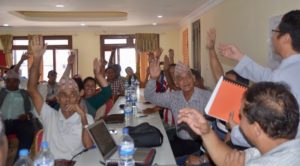 Accountability Counsel has been supporting communities on this case since March 2018. We have worked closely with our local partner, LAHURNIP, to accompany the FPIC and Rights Forum in their pursuit of justice.
Accountability Counsel has been supporting communities on this case since March 2018. We have worked closely with our local partner, LAHURNIP, to accompany the FPIC and Rights Forum in their pursuit of justice.Together, our work on this case has included:
- Supporting communities to draft and send a Nepali and English complaint to the EIB’s Complaints Mechanism, requesting mediation;
- Supporting communities to conduct a community-led survey, draft a report detailing survey findings, and producing an infographic to present the data;
- Accompanying communities during the initial assessment visit by the Complaints Mechanism in Lamjung;
- Five information exchange workshop trips to Lamjung to meet with communities affected by the 220 kV Marsyangdi Corridor;
- Supporting communities in ongoing communication with the EIB’s management, services, board members and the Complaints Mechanism;
- Coordinating an independent scientific assessment of the project’s environmental and social documentation; and
- Accompanying communities as their concerns were vindicated in a landmark report from the EIB’s accountability mechanism.
-
Case Media
Videos
Media Coverage
- 30 April 2025 Indigenous Peoples rights violated in hydropower projects across Nepal, report finds By Nikita Pandey, Carbon Pulse
- 9 October 2024 The European Investment Bank’s woeful ‘green’ track record in Nepal By Sutharee Wannasiri, Accountability Counsel, and Durga Mani Rai, LAHURNIP
- 13 September 2022 Who Pays The Cost Of Europe’s Energy Crisis? By Sutharee Wannasiri, Accountability Counsel
- 23 June 2021 EU Energy Project in Nepal Sets Landmark Precedent on Indigenous Consent By Anirudha Nagar, Accountability Counsel
- 18 June 2021 लमजुङका २२० केभी पीडितको गुनासोपछि यूरोपेली लगानी बैंकद्वारा प्राधिकरणको भुक्तानी रोक्ने चेतावनी By Mulkhabar
- 17 June 2021 मापदण्ड पूरा नगरे प्राधिकरणको बाँकी भुक्तानी रोक्ने यूरोपेली लगानी बैंकको चेतावनी By Image News
- 5 June 2021 Når ren energi kommer på tværs af oprindelige folks rettigheder By Thomas Jazrawi, Globalnyt
- 23 May 2021 हाईटेन्सनलाइन पीडितलाई सफलता, मापदण्ड पूरा तगरेमा प्राधिकरणलाई बाँकी रकम उपलब्ध नहुने By Swatantra Shakti Weekly
- 4 May 2021 Report criticizes EIB over Nepal energy project By Vince Chadwick, Devex
- 30 April 2021 Rare win for Nepal indigenous groups as EIB admits ‘gaps’ in hydropower project By Rina Chandran, Thomson Reuters Foundation
- 13 November 2020 Quand la Banque de l’Union européenne est accusée de négliger les droits de l’Homme Elodie Lamer, Le Soir
- 8 November 2020 EU bank supports projects linked to human rights violations, NGOs claim By Kalyeena Makortoff, The Guardian
- 9 January 2020 Von Luxemburg nach Lamjung By Shankar Limbu, LAHURNIP in Südasien
- 11 October 2019 European Commission criticises the EIB’s role as a development bank By Ola Antonowicz-Cyglicka CEE Bankwatch
- 15 August 2019 European donor to audit power utility’s compliance with rules By Prahlad Rijal, The Kathmandu Post
- 10 August 2019 Utility refuses to join resolution process proposed by Complaints Mechanism By Prahlad Rijal, The Kathmandu Post
- 15 October 2018 Nepal and the China-EU Lending Race By Peter Gill, The Diplomat
- 10 August 2018 Indigenous people demand their say in power project By Bibek Subedi, Kathmandu Post
- 9 August 2018 Protecting the Rights of Indigenous Peoples in Nepal By ELAW
- 11 September 2017 Bharatpur-Manang power line to be built By Aash Gurung, Kathmandu Post
Op-Eds
- 1 May 2020 The Missing Piece of Nepal’s MCC Debate By Anirudha Nagar, Accountability Counsel, in The Diplomat
- 7 May 2019 Communities Call for the Construction of the 220 kV Marsyangdi Corridor to Be Paused By Shankar Limbu, LAHURNIP, and Siddharth Akali, Accountability Counsel; in The Record
- 29 November 2018 Web of Concerns Over Transmission Lines in Nepal By Siddharth Akali, Accountability Counsel, & Shankar Limbu, LAHURNIP, in The Third Pole
- 8 August 2018 Why Lamjung communities are demanding EU funded energy project respect rights By Siddharth Akali, Accountability Counsel, & Shankar Limbu, LAHURNIP, in The Record
Blog Posts
- 28 April 2025 New resource guides Indigenous communities defending their rights in Nepal By Accountability Counsel and Lawyers’ Association for Human Rights of Nepalese Indigenous Peoples
- 27 October 2021 Transmission Tragedy in Nepal’s Lamjung District By Accountability Counsel
- 5 February 2019 Gaining Access to Information: The Case of Nepali Communities & The World Bank By Siddharth Akali, Accountability Counsel and Shankar Limbu, LAHURNIP
- 12 December 2018 Protecting Defenders in Development: Lessons Learned from Nepal By Siddharth Akali, Accountability Counsel and Shankar Limbu, LAHURNIP
- 28 September 2018 Gaps in World Bank’s Access to Information Approach are Failing Nepali Communities and Perpetuating Violence By Siddharth Akali, Accountability Counsel & Shankar Limbu, LAHURNIP
Press Releases
- 28 April 2025 New report reveals how government and development banks have failed to uphold Indigenous Peoples rights in hydropower projects across Nepal By Accountability Counsel and Lawyers’ Association for Human Rights of Nepalese Indigenous Peoples
- 16 May 2022 The European Investment Bank must walk the talk and uphold its zero-tolerance policy on reprisals against communities in Lamjung District, Nepal By FPIC & Rights Forum, LAHURNIP, and Accountability Counsel
- 22 April 2021 Nepal Indigenous communities vindicated in rare European human rights victory
- 8 October 2020 Indigenous communities in Nepal launch Free, Prior, and Informed Consent protocol for EIB-funded Marsyangdi Corridor transmission line
- 22 November 2019 Investors in Nepal’s hydropower sector must address concerns of local communities and Indigenous Peoples
- 20 March 2019 Press Release: European Union Bank Watchdog Visits Communities in Nepal Concerned About Marsyangdi Transmission Line
- 22 October 2018 Press Release: World Bank expert’s report says lack of community participation causing conflicts in Nepal’s energy sector
- 8 October 2018 Press Release: Communities in Nepal Request European Investment Bank Complaints Office for Mediation
- 9 August 2018 Press Release: Communities in Lamjung district (Nepal) demand Free, Prior, and Informed Consent (FPIC) on International Day of Indigenous Peoples
Photos
-
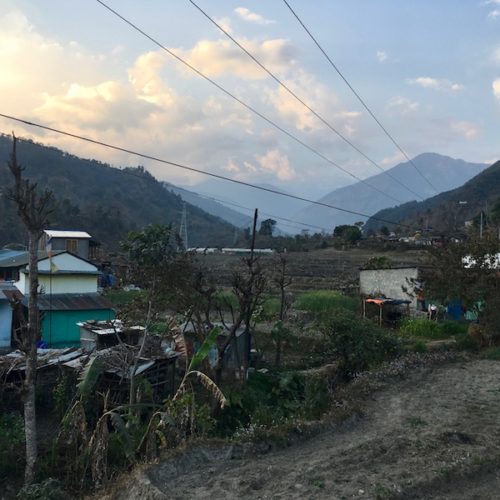 Multiple transmission and distribution lines in residential, agricultural and community areas through which EIB’s 220kV Marsyangdi Corridor will pass (February 2018, Lamjung district)
Multiple transmission and distribution lines in residential, agricultural and community areas through which EIB’s 220kV Marsyangdi Corridor will pass (February 2018, Lamjung district) -
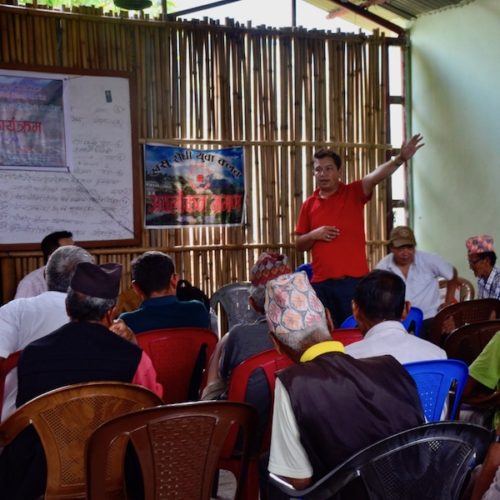 Mr. Chandra Misra, Secretary of the FPIC & Rights Forum, discussing the project with community members in the Khasur village (July 2018, Lamjung district)
Mr. Chandra Misra, Secretary of the FPIC & Rights Forum, discussing the project with community members in the Khasur village (July 2018, Lamjung district) -
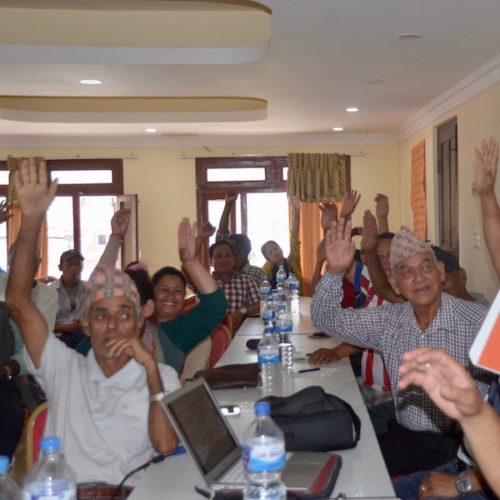 Community members discussing environmental assessment completed for the project (July 2018, Lamjung district)
Community members discussing environmental assessment completed for the project (July 2018, Lamjung district) -
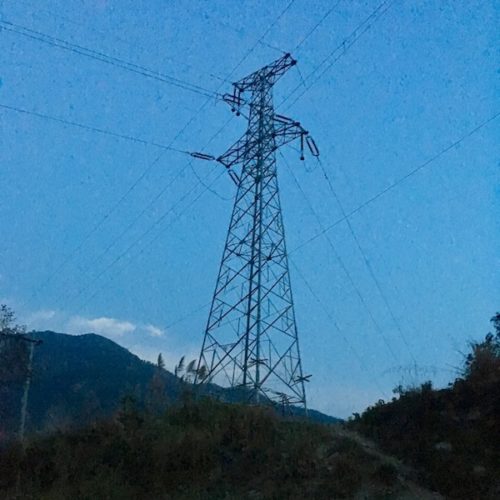 Chinese implemented 132 kV Bhulbhule Mid-Marsyangdi high voltage transmission, proximate to planned route for the EIB’s 220kV Marsyangdi Corridor (February 2018, Lamjung district)
Chinese implemented 132 kV Bhulbhule Mid-Marsyangdi high voltage transmission, proximate to planned route for the EIB’s 220kV Marsyangdi Corridor (February 2018, Lamjung district) -
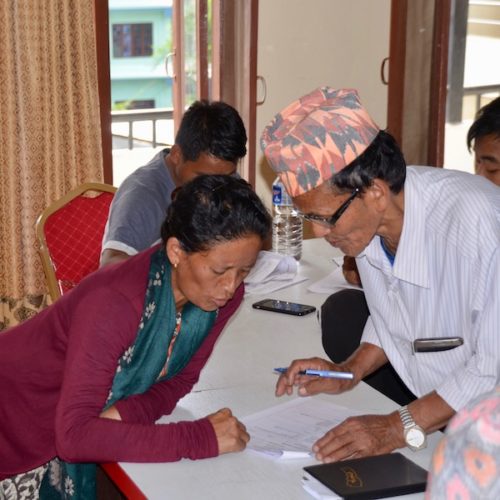 Community members from Khasur village, Nepal documenting their concerns about the 220kV Marsyangdi Corridor
Community members from Khasur village, Nepal documenting their concerns about the 220kV Marsyangdi Corridor -
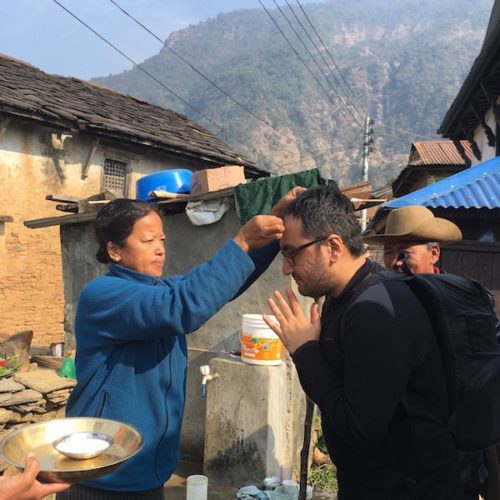 Community member wishes Accountability Counsel’s team safe travels after training (February 2018, Lamjung district)
Community member wishes Accountability Counsel’s team safe travels after training (February 2018, Lamjung district) -
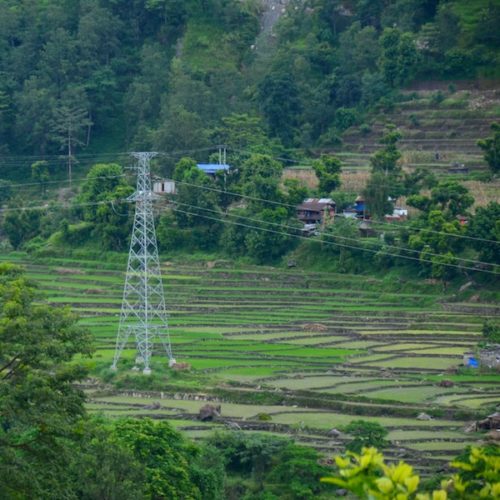 Chinese implemented 132 kV Bhulbhule Mid-Marsyangdi high voltage transmission, proximate to planned route for the EIB’s 220kV Marsyangdi Corridor (July 2018, Lamjung district)
Chinese implemented 132 kV Bhulbhule Mid-Marsyangdi high voltage transmission, proximate to planned route for the EIB’s 220kV Marsyangdi Corridor (July 2018, Lamjung district)

